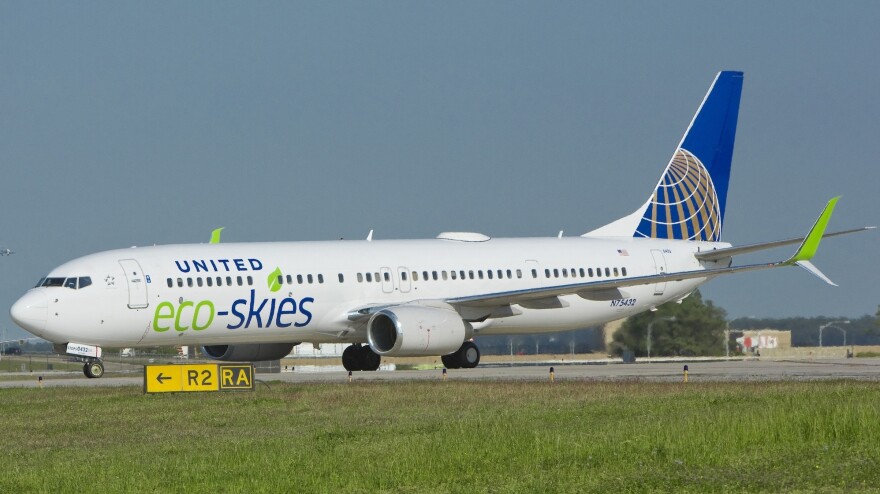What do beef tallow and manure have in common with t-shirts and pine needles? Turns out you can make high-quality, low-carbon transportation fuel with all of them. A growing number of biofuel producers are teaming up with farms, meatpackers and waste management companies to tap gassy waste to meet new demand for renewable jet fuel and diesel for vehicles.
Lots of different agricultural feedstocks – from sugarcane to sweet potatoes — can be used in renewable fuel. But there's a bonus if you use organic waste. Methane, a super potent greenhouse gas, is released into the atmosphere as manure and food decompose. And that gas and that waste are increasingly a liability for farmers.
According to Steve Kaffka, director of the California Biomass Collaborative at the University of California, Davis, anaerobic digesters, which convert the waste into biogas and power, can be a good way for large farms to minimize their waste and create a value-added product from it at the same time.
Meanwhile, the transportation industry is starting to feel the heat to fill up on renewable fuels. Airlines aren't yet required to shrink their carbon footprints, but the Environmental Protection Agency is currently seeking public input on emissions standards that could one day apply to airlines operating in the U.S. The EPA says domestic aircraft account for 11 percent of the US transportation industry's greenhouse gas emissions, and that these emissions contribute to air pollution in the atmosphere and endanger public health.
"Reducing greenhouse gas emissions from the fuel that powers our transportation is a critical part of addressing climate change. When fuel can be made out of waste into a value-added product, there can be big benefits," says an agency spokesperson.
Many airlines aren't waiting for regulations to be enacted.
United has purchased 15 million gallons of renewable jet fuel made from beef tallow, or fat, by Alt Air Fuels and plans to use the fuel this year for Los Angeles-to-San Francisco flights. The airline has also invested $30 million in Fulcrum BioEnergy, Inc., which uses household garbage, including food waste, for its fuel feedstock.
FedEx and Southwest Airlines recently each bought 3 million gallons of jet fuel that will be made from forest waste by Red Rock Biofuels. FedEx has a goal to get 30 percent of its jet fuel from alternative sources by 2030. In July, UPS announced it would purchase 46 million gallons of renewable diesel made from used cooking oils, animal fats and algae in the next three years for its delivery trucks.

In Indiana, Fair Oaks Farms does the waste-to-fuel production itself with the help of a digester. This huge, sealed container converts half a million gallons of manure from 15,000 cows and 3,000 hogs into biogas. The biogas is captured, cleaned, compressed and odorized before being used to fuel a fleet of 42 tanker trucks that deliver Fair Oaks' milk from Michigan to Tennessee.
"We are extremely interested in converting all of our waste to a full asset instead of a liability," says Fair Oaks President Mike McCloskey. "Our goal is to sooner or later have a completely closed cycle where we're taking full advantage of sustainability."
Fulcrum claims one gallon of its renewable fuel produces 80 percent less greenhouse gas emissions than one gallon of conventionally produced petroleum-based fuels.
"There's a huge carbon savings from our process," says Rick Barraza, vice president of Fulcrum. "Airlines are looking at that and being able to show that they are reducing their carbon footprint with the fuel that they're buying from us."
But Kaffka of the California Biomass Collaborative says the industry is still struggling to measure the true carbon footprint of biofuels, and how much emissions they actually offset. "It's difficult methodologically and in part because a lot of biomass is produced under varying circumstances," Kaffka says.
Alt Air's green jet fuel promises to reduce greenhouse gas emissions by between 65 and 85 percent. The company produces its fuel in a retrofitted asphalt factory and petroleum refinery southeast of Los Angeles with beef fat from Midwest meatpacking companies like National Beef. Its advanced hydroprocessing technology involves adding hydrogen to the tallow to remove oxygen before refining the fuel to meet stringent aircraft fuel specifications. It can then be blended at a 50-50 ratio with standard petroleum-based fuel.
Secretary Tom Vilsack of the U.S. Department of Agriculture says his agency also sees food waste and other animal products as a tremendous energy opportunity. "I have no hesitation in telling you that we will have plenty of feedstock," he said in April in a speech at Michigan State University. "The challenge is figuring out how to do it, where to do it, and the most efficient way region to region to do it, and using the feedstock that makes the best sense for that particular region."
Abbie Fentress Swanson is a journalist based in Los Angeles. She covers agriculture, food production, science, health and the environment.
Copyright 2021 NPR. To see more, visit https://www.npr.org.



